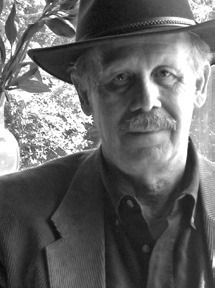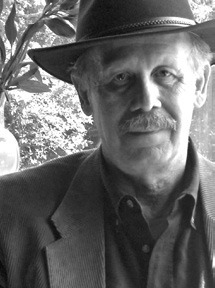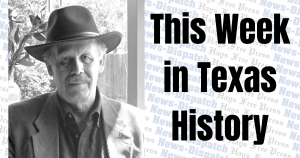
“Big Bad John,” a talking ballad written and recited by a tall drink of water from the Texas Panhandle, stayed at No. 1 on the Billboard Top 40 for the week of Dec. 4, 1961.
Jimmy Ray Dean was born in Plainview the summer before the stock market crashed. His father’s answer to the Depression was to run off leaving his wife to raise their two boys by herself during the hardest times in living memory.
Too proud to accept New Deal relief, Ruth Dean turned sugar sacks into shirts for her sons. The other kids never tired of making fun of Jimmy’s scarecrow appearance, but he credited the constant ridicule with lighting the fire of a burning ambition.
Even as a six year old, Jimmy had to do his part to put food on the table. “I was a hard working little boy,” he told a TV Guide interviewer in 1964. “Oh, I worked. Pulling cotton, shocking grain, cutting wheat, loading wheat, chopping cotton, cleaning chicken houses, milking cows, plowing.”
Besides an uncompromising work ethic, Jimmy’s mother also instilled a love of music and even taught him to play the piano. He later learned the harmonica, accordion and guitar on his own.
Dean dropped out of high school at 16 to help support the hard-pressed family but wound up joining the merchant marines and later the Air Force. It was while he was stationed at an air base near Washington, D.C., that he got his first paying gig as a musician by filling in with his accordion for a sick fiddle player.
After his discharge, Dean remained in the Washington-area forming one short-lived musical group, the Tennessee Haymakers, before the Texas Wildcats in 1952. The next year he recorded his one and only hit single of the decade, “Bummin’ Around.”
However, Dean and the Wildcats found the success that eluded them in the recording studio with a radio show called “Town and Country Time.” The Texan and his back-up band, which included Roy Clark until Dean fired him for being late once too often, attracted loyal listeners in Delaware, Maryland and Virginia as well as metropolitan D.C.
In 1957 the Wildcats and their personable front man parlayed their popularity into a three-hour, Saturday night television program billed as “Town and Country Jamboree.” That same year, Dean proved he could fly solo as the host of a weekday a.m. show.
Impressed by the talented Texan’s down-home personality and sense of humor, CBS picked up “Country Style” under the name “The Morning Show.” for its local affiliates. For eight months, the country boy from the Panhandle gave Dave Garroway and the well-established “Today Show” a run for their money.
The end of “The Morning Show” did not mean Dean’s television career was over. Within the year, he was back on CBS with “The Jimmy Dean Show” that aired six afternoons a week until June 1959.
Dean may not have been on the small screen in 1961, but his voice seemed to be on the radio 24 hours a day. “Big Bad John,” the story of a self-sacrificing miner that Dean wrote on an airplane in an hour and a half, skyrocketed to the top of the pop-music charts and stayed there for five weeks. The biggest hit of his career sold more than a million copies and won him a Grammy for Best Country and Western Recording.
By 1963 Dean was back in America’s living room with a weekly variety show that helped to bring country music into the cultural mainstream. It was on “The Jimmy Dean Show” that Roger Miller introduced “King of the Road.” The appreciative performer sent his fellow Texan a gold doorknob mounted on a piece of mahogany with the inscription: “To Jimmy Dean. For the one million doors you’ve opened for me, I’m forever grateful.”
Although “The Jimmy Dean Show” was cancelled after three years, its namesake was no stranger to television. He was an occasional guest on programs like “The Ed Sullivan Show,” “The Pat Boone Chevy Showroom and “The Hollywood Palace.”
Dean also tried his luck at acting. He appeared in six episodes of Fess Parker’s tv series “Daniel Boone,” along with “Fantasy Island” and other primetime programs. In 1971 he landed a big part in the James Bond movie “Diamonds Are Forever” as an eccentric millionaire easily mistaken for Howard Hughes.
Two years earlier, Dean had gotten into the sausage-making business with a Plainview plant run by his brother. His appealing off-the-cuff commercials made Jimmy Dean Sausage a hot item in grocery stores, and he stayed on as spokesman for the breakfast food after selling the company to Sara Lee in 1984.
Late in life, Dean returned to his roots. Plainview honored him with a “Jimmy Dean Day” and the high school presented him with a treasured diploma. Dean and his wife donated a million dollars to Wayland Baptist University in 2008, a record-breaking check for a small college with an enrollment of 1,200.
In the summer of 2010, Jimmy Dean passed away watching television in his Virginia home. He is entombed on the grounds in a nine-foot-high, piano-shaped mausoleum that bears an epitaph borrowed from the last line of “Big Bad John” – “Here Lies One Hell of a Man.”
A Christmas special! “Depression Desperadoes,”“Murder Most Texan,” “Texas Boomtowns,” “Unforgettable Texans” and “Entertainers” just $19.95 each. Mail your check to Bartee Haile, P.O. Box 130011, Spring, TX 77393.













